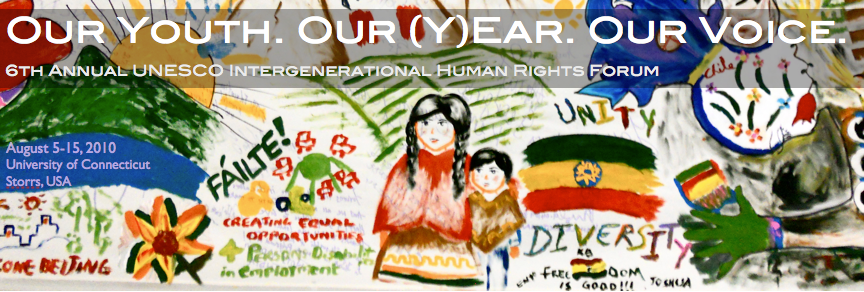We started today with diverse and interesting lectures, a keynote speaker throughout the morning and afternoon, followed by time to raise questions and hear other people´s opinions and cases.
The topics addressed today were: Peace culture and education, Millennium Development Goals, the role and work of the UN in the world and the Universality of Human Rights.
Culture of Peace: Dr. David Adams
 |
| "No enemy, no war" Dr. Adams said. |
We spent an important part of the session conceptualizing the Culture of War, and in turn the opposite idea, the Culture of Peace, as an alternative. After brainstorming about both terms, we came up with the following concepts. The Culture of War is defined by Oppression, Enemy, Competition, Weapons-Military, Control of Information, Male Dominance and Male Led Conflict, Profits, and Power. The Culture of Peace is defined by Human Rights, Solidarity-Tolerance-Understanding, Cooperation, Disarmament, Free flow of Information, Equality of Men and Women, Sustainable and equitable human development, Democratic participation, and Education for Peace.
David continued his lecture by mentioning problems like the lack of awareness of the Culture of Peace, the marginal support of the UN to achieve it, and the monopoly of violence by states. "You are not allowed to kill anybody, unless you work for the State". Some participants found his statements idealistic and controversial, particularly those related to the monopoly of violence by states, and came up with the following questions:
Is a culture of peace possible in Middle East ern countries, where powerful officials in control of the state are appointed, not elected, and therefore alienated from the consensus of the populace? Is the police force a manifestation of the culture of war? What can students in universities do? Can the state bring peace?
As part of his presentation, he presented some notable links and resources:
Report on the Decade for a Culture of Peace, directed by attendee to the forum Marcos de Oliveira.
Decade for the Culture of Peace website
Culture of Peace website - created by David Adams, with online access to his books and articles.
He ended his lecture with the motivator that "Peace is in our hands"
As part of his presentation, he presented some notable links and resources:
Report on the Decade for a Culture of Peace, directed by attendee to the forum Marcos de Oliveira.
Decade for the Culture of Peace website
Culture of Peace website - created by David Adams, with online access to his books and articles.
He ended his lecture with the motivator that "Peace is in our hands"


No comments:
Post a Comment